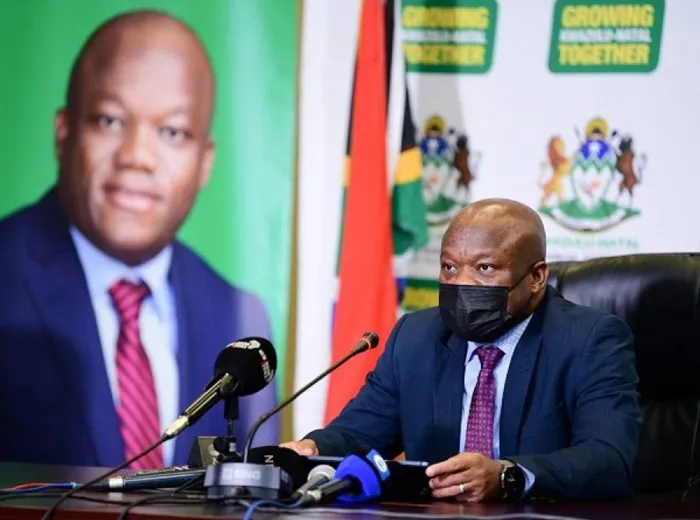KZN provincial government to intensify Covid-19 response for festive season to curb the third wave

KZN Premier Sihle Zikalala announced that the province would be retaining more than 15 000 contract staff members to speed up the province's efforts to achieve herd immunity. He said KZN aimed to vaccinate at least 7.2 million people by the end of March 2022. KZN Premier Sihle Zikalala updating the media on the provincial Covid-19 statistics. Picture: Supplied
DURBAN - KwaZulu-Natal Premier Sihle Zikalala said the province would be retaining more than 15 000 contract staff workers for a further six months – until March 2022 – which included nurses, administrative clerks, data capturers, and general orderlies, among others, to intensify efforts to make a dent on the province’s response to the Covid-19 third wave.
KZN districts contributing to the high infection rates were named as eThekwini, Umgungundlovu, King Cetshwayo, Zululand, Umkhanyakude, and Ilembe. These districts have, for the past three weeks, had continuous higher numbers, with eThekwini accounting for more than 40% cases daily.
“We highly appreciate the contribution made by these recruits since Covid-19 started, and we want to call upon them to continue working with diligence and dedication, in the service of our fellow compatriots. In the same breath, we express our full gratitude to all health-care workers who have continued to soldier on, under difficult circumstances, since the pandemic began. We also fondly remember and pay tribute to all those who have passed away due to the virus,” said Zikalala.
The premier, accompanied by Health MEC Nomagugu Simelane-Zulu, said the province had managed to dispense more than 2 million vaccinations.
“Our vaccination effort is now in high gear. This week, the province breached the 2 million mark in terms of the number of inoculated people,” said Zikalala.
Of the 11.5 million estimated provincial population, the province aimed to reach over 7 million people to reach herd immunity. Currently, the province said it was only administering 30 000 daily vaccinations.
“We have, as a province, a target of vaccinating a total of 7.5 million people if we are to contribute meaningfully to the country achieving population immunity for the Covid-19 virus. Our target is to reach 60 000 daily vaccinations, which could help us reach our target of 7.2 million vaccinations, by the end of March next year. This will allow us to firmly focus on the task of rebuilding the economy and saving jobs,” said Zikalala.
He added that the recent inclusion of the 18-34 cohort group had boosted the provincial vaccine numbers.
“We are also very encouraged by the positive response that has been shown by young people, aged 18 and over, who have come forward to get vaccinated since they became eligible for the vaccine recently. We share the sentiments that have been expressed by academics elsewhere, that the vaccination of the over-18 cohort is good for us in a number of ways.
“Firstly, it means that all adults with co-morbidities are now eligible for vaccination. But, secondly, as a relatively young country, the over-18 population group is quite sizeable and influential. It, therefore, has the power to change the narrative around vaccination and make it positive. This is especially so, on social media, which is one place that shapes people’s opinions and their general outlook.
“So, indeed, we are pleased that the over-18s are coming out in numbers and sharing their ’selfies’, and posting videos of themselves getting vaccinated. May this spirit continue, because it has a number of positive spin-offs.
“This also means that these youngsters will be safe from the virus – but also, they will pose less of a threat to their parents, grandparents, and other members of their households, who might be of advanced age, or be living with co-morbidities,” said Zikalala.
The premier said the third wave was taking longer to subside than the other two waves.
“We continue to closely monitor trends associated with it. At this point, it is difficult to say what kind of December holiday seasons we will have, in so far as infections and fatalities are concerned. Only time will tell in this regard,” said Zikalala.
The province said it had so far registered 216 754 people, aged between 18 and 34, of which 55 302 had presented themselves for their jab.
“This gives us an average of 7 000 vaccinations among this group, per day. When we compare between the different waves that we have had, we realise that the highest number that we recorded in a day, during the second wave, was 6 700; while, during the third wave, the highest number has so far been 4 198. We remain concerned that our numbers are on an upward trend, while the difference this time around is that children – mostly pupils – are getting infected,” said Zikala.
The provincial government also said it was concerned about increasing numbers of school infections. It said the province has had more than 1 100 Covid-19 cases, in 350 schools, in the past three weeks.
“These numbers are increasing daily and more pupils are testing positive. Sadly, the pandemic has claimed the lives of two 12-year-old schoolchildren, as well as a nine-year-old,” said Zikalala.
The provincial government also highlighted a concern, of 227 confirmed cases of people dying at home from Covid-19.
“This number could be much higher. This is because of the high number of people who are dying at home, but their mortal remains do not get tested before they are buried.
“We are, therefore, once again urging families to allow or request funeral parlours to test these human remains for Covid-19. This is a service that the Department of Health offers, free of charge. It is extremely important that we properly document these deaths, because they inform our approaches and strategies to save lives in future,” said Zikalala.
THE MERCURY
Related Topics: